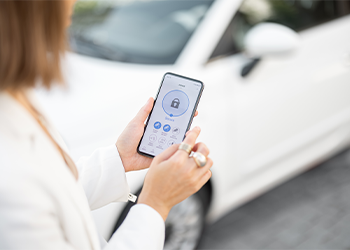Have you ever been startled by a blaring car alarm in the middle of the night? Or perhaps you’ve found yourself cursing at a neighbour’s car for going off at the slightest provocation.
Car alarms have been a part of automotive security for decades, but their effectiveness and impact on our lives have been a topic of debate.

In this blog, we’ll delve into the history, technology, and controversies surrounding car alarms. From their early mechanical origins to today’s sophisticated electronic systems, we’ll explore how car alarms have evolved and whether they truly serve their intended purpose.
The History of Car Alarm
Car alarms have been around for over a century, evolving significantly from their early mechanical systems to today’s sophisticated electronic devices.
When Were Car Alarms Introduced to the UK?
The first car alarms in the UK can be traced back to the early 20th century. Around 1913, rudimentary systems were introduced to deter thieves from stealing the valuable cars of the wealthy. These early alarms often consisted of loud bells or horns that would be activated when someone tampered with the vehicle.
Why Were Car Alarms Introduced?
The primary reason for the introduction of car alarms was to protect valuable automobiles from theft. As cars became more common and expensive, the risk of theft increased, leading to the development of security measures like alarms.
How Car Alarms Were Implemented Over Time
1913:
Early mechanical alarms were introduced, often using bells or horns.
1916:
More advanced systems with pressure-sensitive switches were developed, triggering the alarm when someone opened the door or bonnet.
1919:
Electric alarms started to appear, offering improved reliability and sensitivity.
Today:
Modern car alarms are highly sophisticated electronic systems with various sensors, remote controls, and advanced features.

How Do Car Alarms Work?
Today’s car alarms typically incorporate a combination of sensors to detect potential threats:
Shock sensors:
Detect vibrations or impacts, such as someone breaking a window.
Tilt sensors:
Trigger the alarm if the car is lifted or tilted, indicating a possible tow attempt.
Ultrasonic sensors:
Detect movement within the vehicle’s interior.
Door and Bonnet sensors:
Activate the alarm when these are opened without authorisation.
When a sensor detects a potential threat, it sends a signal to the alarm’s control unit, which activates the alarm’s siren, flashing lights, or other warning devices.
Why Do Car Alarms Go Off?
Car alarms can go off for various reasons, including:
Accidental triggering: Sudden movements, bumps, wind or even loud noises can sometimes set off the alarm.
Malfunctions: Faulty sensors or wiring can cause the alarm to activate unexpectedly.
Intentional triggering: Thieves may intentionally trigger the alarm to distract or scare away potential witnesses.
Silent Alarms
Some modern car alarms offer a “silent alarm” mode. In this mode, the alarm doesn’t activate the loud siren or flashing lights but instead sends a notification to the owner’s smartphone or a security company. This can be useful in situations where a loud alarm might draw unwanted attention.

Do Car Alarms Affect the Car’s Battery?
Yes, car alarms can drain the car’s battery if they are activated for an extended period. If the alarm is triggered accidentally and the owner is unable to turn it off promptly, it can lead to a dead battery.
How Long Until a Car Alarm Turns Off?
Most car alarms have a built-in timer that automatically turns off the alarm after a certain period, typically a few minutes. However, some alarms may require manual deactivation.
If Your Battery Is Dead, Will Your Car Alarm Still Work?
If the car’s battery is completely dead, the alarm will likely not function. However, some alarms may have a backup battery that allows them to operate for a short time even when the main battery is dead.
How to Turn Off My Car Alarm
The method for turning off a car alarm depends on the specific model and year of the vehicle. Common methods include:
Using the remote control:
Most modern cars with alarms have a remote control that can be used to disarm the alarm.
Inserting the key:
In some older models, inserting the key into the ignition may deactivate the alarm.
Using a hidden switch:
Some cars have a hidden switch or code that can be used to disarm the alarm.

How to Disable the Car Alarm of a Keyless Car
Keyless entry cars often have a backup method to disable the alarm in case the key fob battery dies or is lost.
This typically involves inserting a physical key into a hidden slot or using a specific sequence of button presses. Consult your car’s manual for the exact procedure.
Are Car Alarms Effective?
Car alarms can be an effective deterrent against theft, but they are not foolproof. Determined thieves may find ways to bypass or disable alarms. It’s generally recommended to combine car alarms with other security measures, such as steering wheel locks, immobilisers, and vehicle tracking systems, to enhance the overall protection of your vehicle.
Car alarms have come a long way since their early days, evolving from simple mechanical devices to sophisticated electronic systems. While they can serve as a deterrent to potential thieves, their effectiveness can vary depending on factors such as the specific alarm system, the vehicle’s security features, and the determination of the would-be thief.
As technology continues to advance, it’s likely that car alarms will continue to evolve and adapt to new threats. Whether they remain a necessary part of automotive security or are eventually replaced by more advanced technologies remains to be seen.
To ensure your car alarm is functioning properly and providing maximum security, schedule regular maintenance with a trusted mechanic. Our team across our Stoneacre branches are equipped to inspect, test, and repair your car’s alarm system, giving you peace of mind on the road.




